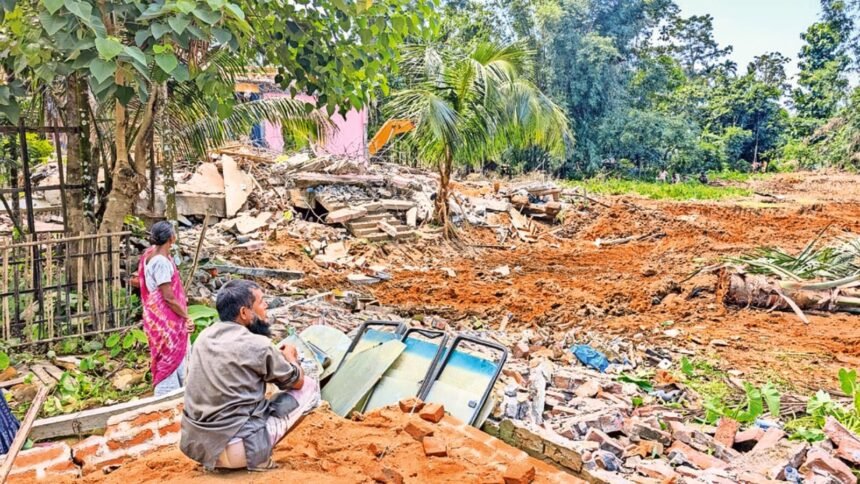On Saturday, Rokibul Hussain (28) spent the morning sitting outside the house his father had built, in Bidyapara in Assam’s Goalpara district, waiting with dread for the bulldozers to arrive. Two bulldozers eventually made their way towards his family’s home, flattening other houses in the row first, while dozens of police and forest personnel stood guard.
At around 11 am, a policewoman was sent to check if anyone was still inside Rokibul’s house. After she gave the green signal, the bulldozer targeted the walls — which had already been stripped bare of the tin roof — working rapidly until the house was completely flattened. It then moved on to the next house while Rokibul watched on silently.
In the state’s fifth large-scale eviction drive within a month, the focus was on the Paikan Reserve Forest area in Goalpara district on Saturday. According to Goalpara Divisional Forest Officer Tejas Mariswamy, the drive sought to remove 1,080 families who had encroached on 140 hectares of forest land.
With this, over 3,300 families — mostly Bengali-origin Muslims – have been displaced through eviction drives in multiple districts including Dhubri, Lakhimpur, Nalbari and Goalpara in just a month. The authorities have claimed that those evicted were encroaching on government/ forest/ panchayat land.
 During the eviction drive in Goalpara Saturday. (Photo: Sukrita Baruah)
During the eviction drive in Goalpara Saturday. (Photo: Sukrita Baruah)
Like the previous exercises, Saturday’s eviction drive, too, was a large-scale affair. With the total area divided into six blocks and six bulldozers working in each block, a total of 36 bulldozers — and another four in reserve — were deployed. Security personnel, including armed police commandos, were spread across the area. Goalpara Superintendent of Police Nabaneet Mahanta said around 1,000 personnel, including forest protection forces, had been deployed on the ground.
Like Rokibul, the other affected families, too, had removed the tin roofs of their houses and taken away all their belongings in the days preceding the eviction.
“We took away all our belongings yesterday, we have kept them at a relative’s house in Jambari (an adjoining settlement), but we spent the night here, with a tarpaulin sheet serving as the roof. Tonight, we will probably have to pitch a tarpaulin sheet somewhere on the road. Let’s see what the authorities will allow,” Rokibul said.
Story continues below this ad
For nearly a month now, the residents of the area had been living under the shadow of eviction.
Sheikh Raju Ahmed (23) said they were first told that they should leave by June 27. “From June 18, announcements telling us to leave were made on a loudspeaker 2-3 times everyday. For around 20 days, police and other forces have been doing the rounds here, and that increased in the last week. Everyone emptied their houses in the last two days and just put their belongings wherever they could,” he said.
 During the eviction drive in Goalpara Saturday. (Photo: Sukrita Baruah)
During the eviction drive in Goalpara Saturday. (Photo: Sukrita Baruah)
In the adjoining Jambari settlement, nearly every house is being used to store the belongings of evicted families. Samesh Ali (28) said that seven families had kept their belongings in his house. “They have kept their things but there is no room for them to stay here, so they will probably have to set up tents somewhere,” he said.
While residents of the affected area have claimed that their families bought the properties as ‘revenue land’ from earlier Garo inhabitants, they were unable to secure a stay on the eviction drive from the Gauhati High Court. On the other hand, forest authorities and the district administration say that the eviction is being carried out in compliance with High Court’s instructions to clear forest land to minimise man-elephant conflict.
Story continues below this ad
While there have been cases of evictions in Assam facing resistance — some people pelted stones at bulldozers and faced police batons in Dhubri earlier this week; two protesters were shot dead after clashing with police in Sonapur last year — there was only a resigned silence on Saturday.
But panic and fear was high. A resident, Fauzaul Hoque, was rushed for medical treatment after he was found trying to hang himself before his home was demolished.
“No one is going to fight here. Everyone is scared of what might happen. Even if you cry, it doesn’t mean that your house will be spared. And if you try to challenge, then you may pay with your life. We can’t do anything about it,” said Shah Jahan Ali.
While eviction drives have become commonplace in Assam in recent years – in the run-up to the 2021 elections, the ruling BJP promised to free government land of “encroachers” and allot the areas to “indigenous landless people” — the exercise has intensified in the past month.
Story continues below this ad
With elections less than a year away, they have taken the form of a hotly contested political issue. While Chief Minister Himanta Biswa Sarma claimed earlier this week that the government has been “restoring the demography” in places where it is conducting evictions, in reference to Bengali-origin Muslims populations, Congress MP Rakibul Hussain has claimed that, if voted to power in the state, the Congress will provide compensation to all Indian citizens who have been evicted in such drives under the BJP government.
On Saturday, a delegation of MLAs from the AIUDF — which has its core support base among Bengali-origin Muslims — tried to visit the eviction site but were stopped by local authorities.
Meanwhile, even after their houses were bulldozed, residents continued to sit by the rubble in the blazing July heat. “There is nowhere for us to go. We have got a tarpaulin sheet, we will put it up this evening. But the authorities have removed the electric transmitter, destroyed the water lines and even the well we used to have in our compound, so we are especially worried about how to look after the children,” said Mofidul Ismal (31).








